Do you use a moisturizer or foundation with SPF? Your makeup may include UV filters, but it may not be enough to protect you from the sun’s radiation. In this guide I’ll teach you the importance of sunscreen to keep your skin healthy and beautiful. You’ll finally know how to protect your skin correctly!
Today I want to keep talking about photoprotection. As you know, sunscreen is the most important product of our beauty routines: it helps us avoid skin diseases and, at the same time, prevent aging, spots and many other problems. We have heard a thousand times that sunscreen is necessary to have healthy skin, and yet there are still many who think that it is enough to use it on the beach (or, sometimes, not even that).
The time to get rid of those thoughts and start using sunscreen daily (yes, even in winter, no excuses) is now. Actually, the right moment was yesterday. The sooner you assume it as a part of your routine when you get up, the sooner you will begin to take care of your health in a simple and very, very effective way.
The topic I am going to discuss today is the difference between using a moisturizer with SPF, makeup with SPF and a proper sunscreen. There are many products that assure you that they protect you from solar radiation, do they do it as well as we think? Quite often I receive questions from followers who are not sure if using a moisturizer with SPF keeps their skin well protected, so let’s take a look at this issue.
The points that I will discuss in this post are the following:
- Composition: what ingredients protect me against radiation?
- You don’t use enough sunscreen.
- Are moisturizer with SPF, makeup with SPF and sunscreen equally effective?
1. COMPOSITION: WHAT INGREDIENTS PROTECT ME FROM RADIATION?
Ultraviolet radiation is a silent enemy. You do not realize, but you face it daily and it’s responsible for photoaging (those wrinkles and spots that begin to appear over the years thanks to UVA rays when they penetrate the dermis) and melanoma and other types of skin cancer (UVB rays are responsible for this as a result of the effects they cause on the epidermis). As you will understand, spending a minute every morning to apply sunscreen is a very simple gesture, it means nothing to you and the benefits are huge.
If you read my post on how to choose the best sunscreen and my comparison of sunscreens you will remember that these products work through a series of filters (physical/mineral or chemical/organic) that act as a barrier to ultraviolet radiation emitted by the sun. In this way, when the sun’s rays impact your skin, this radiation is absorbed (in the case of chemical filters) or bounces (in the case of physical ones) so as not to damage your skin.
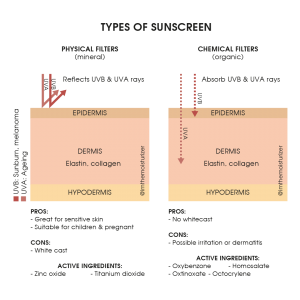
There are many ingredients that act as physical and chemical filters to protect us from radiation. The most common physical filters are zinc oxide and titanium dioxide, they are especially recommended if your skin is sensitive, as well as for children and pregnant women. The most common chemical filters are oxybenzone, oxtinoxate, homosalate and octocrylene. Remember that chemical filters require a period of about 20 minutes to get absorbed and begin to make effect before sun exposure.
Of course, you can go one step further and look for products that, in addition, incorporate other ingredients with photoprotective properties to achieve a more effective result, some examples of these ingredients are vitamin E, beta-carotene or mulberry leaf extract. In any case, remember that there are other important ingredients that you can find in the product, such as those that help actives cling to your skin better or making them resistant to sweat, water, etc.
The first step to know if a moisturizer or makeup that says to include sunscreen really contains it is to search among the ingredients, at least one of those I just mentioned should appear. If none of them is listed, they may have incorporated a less common sunscreen. In any case, be aware that the European regulation is one of the most restrictive ones, so all the sunscreens that are marketed here are tested to confirm that they are safe.
The next thing to keep in mind is: in what position do these ingredients appear? Normally, when we look at the label of a sunscreen we see that filters are the main characters, they appear at the beginning of the ingredients list. As you know, the products that appear first in the ingredients list are those of which there is a greater proportion, so if you find filters at the end of a label with dozens of ingredients, the best thing you can do is find another product.
It is important to be aware the amount of sunscreen that has been incorporated into the formulation of a product, and if it is very low, you will have to reapply it more frequently. Imagine an example: you have a sunscreen with 25% sun filters and a makeup base with 5% of them in its composition. If you want your skin to be truly protected, you will have to apply more of that makeup base or you should constantly reapply it, so in the end it is a less practical solution than having used a good sunscreen first.
2. YOU DON’T USE ENOUGH SUNSCREEN.
Now that you know how to search among the ingredients of your cosmetic products to find out what sunscreens are included and in what proportion it is time to face reality: you do not use enough sunscreen. It is a fact. Alright, it is better to use little than nothing, and it is better to use it only once (without reapplying it after 2 hours) than not using it, but it still is not enough.
When studies are carried out to analyze the effectiveness of sunscreens (and thus be able to determine to what extent they protect and their SPF and PA values), an amount of 2mg/cm2 is taken as a reference, it is considered effective to protect us against radiation. To understand it, the equivalent would be about a quarter of a teaspoon of product. Stop for a moment to think about it: do you really use that amount or do you just apply a thin layer so that it is absorbed as soon as possible? Probably you do not use enough of it. Do you want a trick to know if you use enough? You should use approximately 1.25 g of product each time. Assuming that you reapply it only once a day (2.50 g daily) and that a facial sunscreen normally contains 50 ml of product, a container should last approximately three weeks. Yes, you read it right. How often do they last for you?
In the case of sunscreen it is better to use a generous dose than falling short, since in the latter case what you are going to achieve is not protecting your skin as it needs. A study published this year showed some very interesting conclusions: when we apply a moisturizer with SPF we use less quantity than we apply sunscreen, imagine in the case of makeup. The consequences of this are clear: if you just use a moisturizer or foundation with SPF and do not use as much as you should your skin will not be protected and you should do something else to make sure it is well taken care of. It may seem obvious, but if you do not protect your skin against radiation you are voluntarily exposing yourself to its damage.
There are many tricks to know if you use the correct amount of sunscreen: you can make two lines on your index and middle fingers, you can take a teaspoon and fill a quarter of it with product before applying it on your skin… the important thing is that you find a system that It works for you and, when in doubt, apply a little more.
We must not forget an important fact, and to ensure that you avoid the damage of solar radiation you must reapply the sunscreen. In an ideal world, by applying it only once your skin would already be protected for the whole day, but the reality is that as time passes the sunscreen’s effectiveness decreases (even faster more if you exercise, bathe or expose yourself very directly to the sun). The period that must pass before you reapply it changes according to many factors, some studies recommending reapplying it after 15 or 30 minutes until 2 hours. In any case, do not hesitate to reapply sunscreen throughout the day.
3. ARE MOISTURIZERS WITH SPF, MAKEUP WITH SPF AND SUNSCREEN EQUALLY EFFECTIVE?
As we have seen throughout the post, there are many factors that determine if a sunscreen is enough. The best thing is that, generally speaking, it is in our hands to achieve a more or less effective protection: choosing a good product, applying it correctly and reapplying it after a few hours.
If you want to go the safe way and you can choose between using a moisturizer with SPF, foundation with SPF and a sunscreen my recommendation is that you use all three. After all, they are not incompatible with each other and your skin will thank you. If you do not want to use all three the solution is clear for me: sunscreen is always my number one choice.
The moisturizer with SPF protects you against solar radiation, but it is most likely not as effective as a sunscreen itself (because of its composition and the way you apply it, as I mentioned earlier). Something similar happens with makeup with SPF, it is useful when it comes to preventing damage from ultraviolet radiation, but it will always be better to combine it with a good sunscreen to make sure your skin is well protected.
The sunscreen is specifically designed to filter UVA and UVB radiation and thus avoid photoaging and the diseases associated with it. Also, both moisturizers and makeup that incorporate sunscreens provide an extra dose of protection but, not being created for that main purpose they tend to be less effective. So you know, if you are looking for the best protection against radiation, the ideal is to combine your moisturizer with SPF, your sunscreen and then apply a foundation/BB cream with SPF. When in doubt, if you can only choose one of those products, always choose the sunscreen. Reapply them after a couple of hours and you will get a healthy and protected skin.
Do you normally use sunscreen properly? Do you combine it with moisturizer and makeup with SPF? If you have any questions about the subject, do not hesitate to leave me a comment and I will answer you as soon as possible.
If you liked this post and want to continue learning how to take good care of your skin, you will be interested in taking a look at these two:
Do you want to learn to take better care of your skin? You can see an index of all my informative posts here.
● Follow me on Instagram, Facebook, TikTok and Pinterest.
● Share, comment and like my posts on social media.
● Shop through my links to help me keep up with this blog.

I’m Nacho and I’m passionate about skincare. I really enjoy learning and sharing my knowledge about skincare and I read scientific papers so you don’t have to. I want to break stereotypes because I believe skincare has no gender: skin is skin.


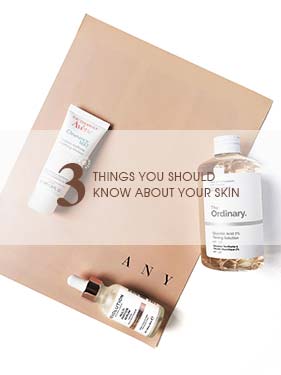
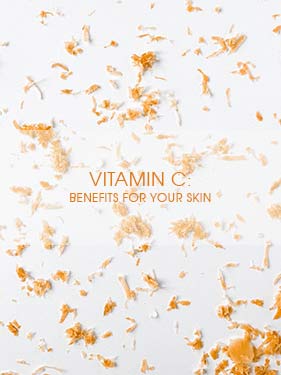
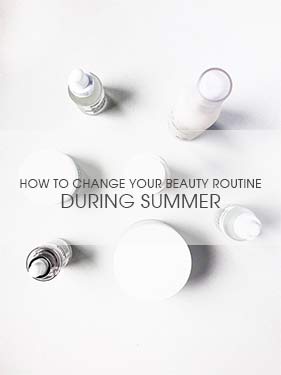
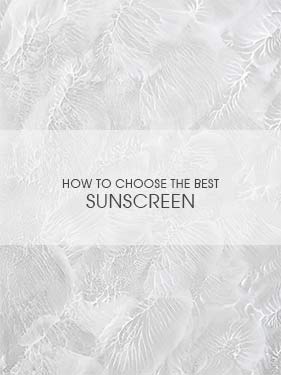
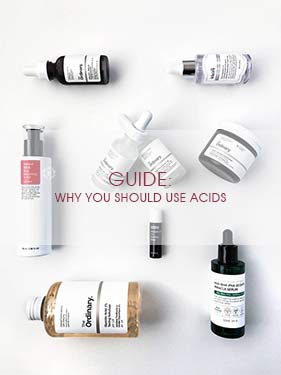
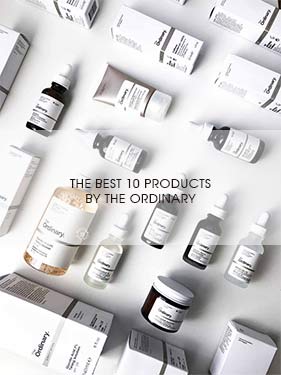
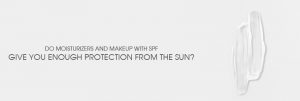

I hate so much when people think that moisturizer or fluid with spf is enough. Even license exam in my country has an answer “moisturizer with spf for day”, I guess it’ll take age to change this way of thinking 🙁
I totally agree with you! A proper sunscreen is always necessary in skincare routines, and it is important for us to help raise awareness on that issue. It’ll take time, but I’m sure we’ll make it! 😊